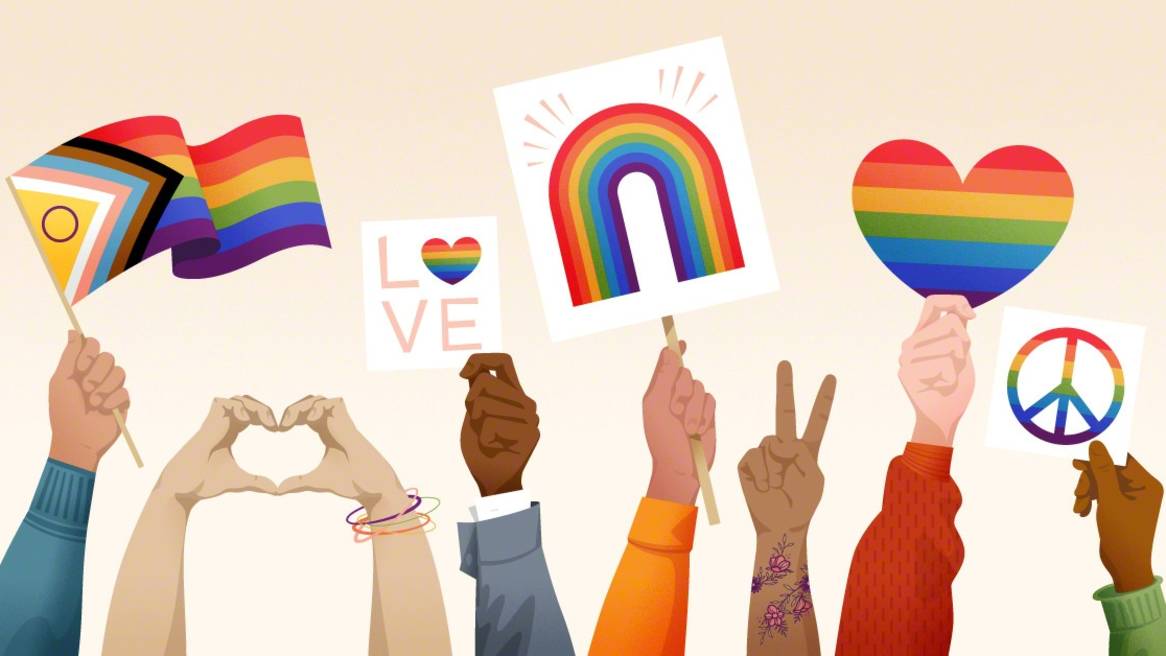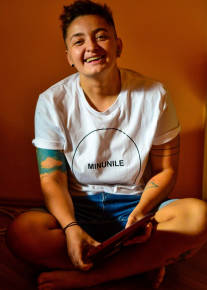Practicing Pride
A journey to a more inclusive workplace and community.
An inclusive culture and a sense of belonging is rooted in the employee experience. Kinga Pakucs, Steelcase Learning and Development consultant, aspires to help create a culture that reflects the communities where we live and work. Kinga, a member of the Steelcase Pride business inclusion group, is helping Steelcase foster diverse, equitable, and inclusive environments where people, businesses, and communities can thrive by creating spaces where everyone feels safe, included and able to participate.
Recently, Kinga coordinated the support of a number of Pride month activities in Cluj, Romania including the local Pride march. Kinga was inspired by Andre Radulescu, founder of Identity.Education and organizer of the first Pride events in western Romania. Andre attended the march with other Steelcase employees, and joined a global Steelcase conversation to foster an open dialogue and create understanding and awareness as we work toward inclusion. Andre, shared personal experiences around gender identity as well as shed light on systemic challenges faced by individuals who don’t identify within the traditional gender spectrum. Kinga moderated the conversation.
Kinga Pakucs: Tell us about when you first felt a need to make change in the world?
Andre Radulescu: I wasn’t always thinking about changing the world. I began thinking about organizing LGBTQI+ events in 2013 to create a space for the local community to socialize. By being more a part of the community, I started to to see that I was comfortable with my sexual orientation and my coming out. I also realized I was privileged because I could talk about those subjects at work, with family and friends. I was in a much better situation than many LGBTQI+ people in Romania. I heard so many stories about people who don’t have it easy. I decided I wanted to use my professional and personal experiences to do more for and with the community. There are amazing stories that should be heard. I spent four years discovering how to help and being courageous enough to create a platform which is Identity.Education now.
KP: Could you help us clarify some basic terms when it comes to gender identity and gender expression so we have the same understanding?
AR: Of course, I’ll do my best to share definitions of some common terms. Gender identity is the sense of one’s own gender. It doesn’t equal the sex assigned at birth which can be female, male or intersex. It’s how I see, feel and present myself. Gender expression is how this identity is being manifested physically — how I talk, dress, use pronouns and let other people see me. Non-binary people do not identify exclusively as a female or male. They may identify with some characteristics of male and female, neither or different combinations. I am a non-binary person who is agender. Agender means I don’t identify with any gender of any combination. There are no words I can find to describe my identity. I understand for some people there is gender. But I just think that’s not necessarily for me. Heteronormativity is the assumption that everyone around us is heterosexual and also cisgender (people whose gender identity equals their assigned sex at birth).
KP: You live in Romania, speak multiple languages and travel all over the world. How do you handle cultural differences?
AR: I make sure when I’m traveling to do a little bit of research and understand how these terms are used. I listen to people from that region and that specific society to hear how they’re using certain terms.
KP: It is culturally ingrained in people to use pronouns based on a person’s physical appearance. How do you recommend approaching the topic of pronouns?
AR: I definitely listen to how people refer to themselves. Don’t assume someone’s gender identity. Use general phrasings or start the discussion by introducing yourself. I always start by saying “These are my pronouns.” In English, I use they/them. But in Romanian, this is not possible because Romanian is a very gendered language. So it can depend on the language. In email, some people will add it to their signature. It’s a very small thing that can make a big difference. Everyone should be encouraged to use pronouns regardless of gender identity. This shows that everyone is working together. It’s a mindset shift and helps everyone practice getting used to this.
Companies are making changes too. A global airline recently announced they will use non-gender language on their flights. They are replacing “ladies and gentlemen” with “passengers and guests.” Moving toward non-gender expressions can be as simple as rephrasing common language.
KP: What is your relationship with social media when it comes to telling stories?
AR: When I was discovering my identities, there were no words I knew to describe myself. There were no portrayals in mass media. The ones that were there were not favorable. Gender identity didn’t exist. The internet and social media allowed me to spend more time with the community. I realized there is non-binary and agender. It was immediately something that finally described how I feel. There are many people who tell stories in all languages. It’s important to know your source and read stories from people who have lived these experiences. Together we can change language and society. We can educate and give space to people who are going through this and whose experience this is.
KP: Can you share suggestions for how to make progress on a more inclusive workplace?
AR: In some languages like Romanian, gendered notes and messages can go out automatically in email. Instead, you could add a slash in gendered languages to indicate more than one gender. If you have contracts, do you allow for non-binary people who don’t use just one pronoun? Or how difficult is it for someone to switch names or gender when it comes to their identification at work or their email address? Do you train people to welcome guests with non-gender terms instead of “Hi, guys” or “Hi, ladies”? You can practice these concepts so that they become a part of your regular conversations. I encourage everyone to practice.
KP: How big a part of your life is your gender identity?
AR: It starts from the fact that we live in a heteronormative society. It’s systemic. When people see me, they only see a difference and it takes a while to integrate that into your language. That’s why it is important for our community to tell their stories. Everyone’s story is different. My experience coming out as agender is totally different from my colleagues’. Nobody owns anybody else’s stories. For me, every time I tell my story about coming out, it’s a process. It never gets easy. But that’s not all I am. I’m a project manager. I love production and logistics. I’m a powerlifter. I love mangoes and love to cook. We need to make human connections. We all have more than one story.
I encourage people to be informed, check information and not put the responsibility on someone else. This is a shared responsibility. We’re doing this together. When you ask a question, do it from a place of kindness and take it from there.
To learn more about Andre Radulescu’s organization Identity.Education visit them online. Steelcase designs year-round learning experiences for all employees to foster a culture of inclusion. The Human Rights Campaign Foundation recently honored Steelcase for the eighth time with a perfect score of 100 points on the Corporate Equality Index, designating the company as one of the “Best Places to Work for LGBTQ Equality” in the U.S. and Mexico.
Andre Radulescu (they/them) is the founder of Identity.Education, a LGBTQI+ NGO, and the organizer of the first PRIDE in the western part of Romania. Andre focuses their work primarily on activism through art and culture and on using storytelling as a tool of change.
Andre is a queer activist and senior project manager with extensive experience in coordinating teams in large scale cultural productions and transnational teams, managing a wide range of stakeholders, from clients to public authorities and volunteers. Personally, Andre is a powerlifter and mango lover.



